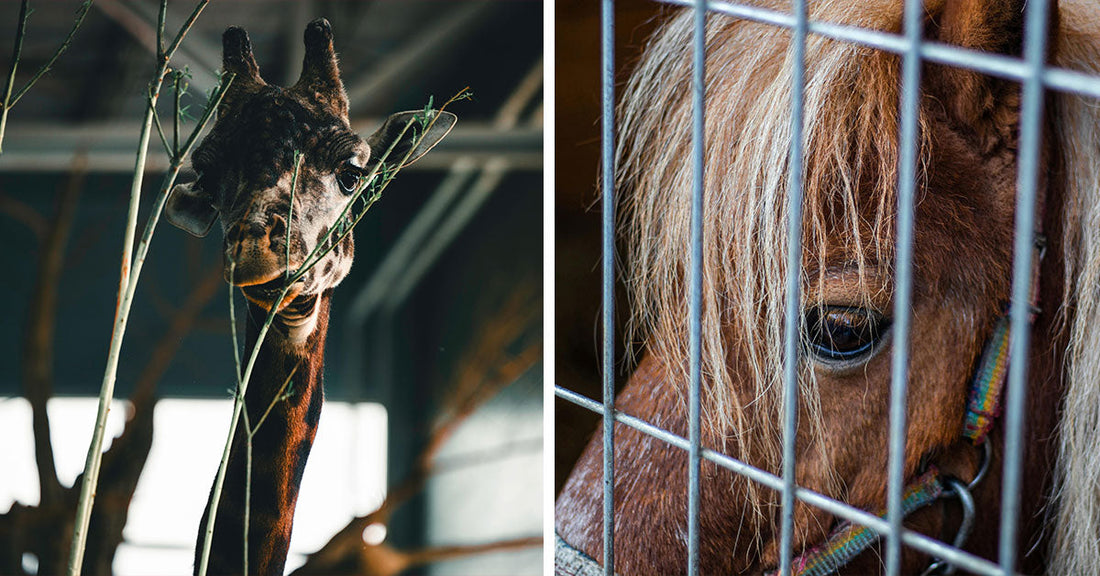Authorities Forced to Euthanize Camel Found With Starving Lions and Dead Tiger at Oregon Safari Park
Matthew Russell
The West Coast Game Park Safari, a roadside zoo on Oregon’s southern coast, promised families up-close animal encounters. What it delivered instead, according to authorities, was a prolonged nightmare of neglect, illness, and death. After years of concern from the community and federal inspectors, state police raided the park in mid-May.
What they found shocked even seasoned officers: malnourished animals, filthy enclosures, rodent-infested feed, and the frozen body of a dead tiger sharing space with food meant for live animals.
One camel, found with multiple untreated medical issues, was in such dire shape that veterinarians determined moving it would kill it. It was humanely euthanized on-site, the only option left after what Oregon State Police described as “suffering” too great to ignore, according to KCBY.

Over 300 animals were seized from West Coast Game Park Safari.
Malnourished Lions and a Tiger in the Freezer
The evidence didn’t stop at the camel. Images released by law enforcement show a lion so emaciated its ribs and spine protruded from beneath its skin. At least three big cats were described by federal inspectors as having “decreased muscle mass,” with their hips and spines visibly outlined through thinning fur.
A dead tiger had reportedly been stored for months in a freezer alongside turkeys that were being fed to other animals, a detail first uncovered in federal documents reviewed by Gizmodo.
U.S. Department of Agriculture reports reveal that the park’s violations were not new. In fact, they date back over a decade. Among other findings: rodents infesting food storage containers, rotting waste piled near enclosures, and a dangerous lack of supervision in areas where visitors were allowed to directly interact with potentially aggressive animals like deer, goats, and even a Syrian brown bear.

One camel was euthanized due to severe untreated medical conditions.
Hundreds of Animals, One Shared Fate
Authorities estimate over 300 animals have now been seized from the park. Each one required evaluation by veterinary teams on-site. Specialists from the Oregon Humane Society, the Oregon Department of Fish and Wildlife, and the Oregon Department of Agriculture reviewed each animal’s health, the quality of its food and water, and the sanitation of its environment.
Oregon State Police say they planned in advance to relocate every animal to what they called “appropriate, reputable facilities.” Their priority, according to spokesperson Kyle Kennedy, was to ensure the animals received proper care after what he described as “lengthy and thorough” preparation leading up to the raid, KOMO News reports.
Ignored Warnings and Community Outrage
Community members had long sounded the alarm. For years, complaints about the park’s conditions circulated through local circles. A petition demanding state intervention circulated in the months leading up to the raid. But small rural agencies lacked the manpower to confront such a large facility alone. Coos County Sheriff Gabe Fabrizio told KVAL that the coordinated multi-agency response that finally arrived was larger than his department’s entire force.
“We’ve been hearing from the community about that place for years,” Fabrizio said. “But logistically, we couldn’t take it on ourselves.”

A dead tiger was found stored in a freezer alongside food for live animals.
Inside the Gates of a Roadside Zoo
Founded in 1968, the West Coast Game Park Safari billed itself as a “walk-through” zoo where visitors could pet and feed exotic animals. By its own account, the park once drew 60,000 visitors per year. But as the animals suffered, it seems no one was watching closely enough.
A USDA inspection just weeks before the raid found rodent feces in feed bins for hoofed animals and again documented malnourished big cats. Photos posted online showed guests petting large, potentially dangerous animals without staff present—a serious violation of safety protocols according to Gizmodo.
Animal welfare organizations have long warned about roadside zoos, many of which lack proper oversight, veterinary support, and humane standards of care. According to the Animal Legal Defense Fund, these facilities often confine animals in inadequate enclosures, deprive them of medical attention, and neglect even the most basic needs like food and clean water.

Enclosures were surrounded by rotting waste and debris.
What Comes Next
The West Coast Game Park Safari is now closed as authorities comb through evidence—photographs, food and water samples, veterinary reports, and animal assessments—to build their case.
While one camel didn’t survive, others now have a chance. Their future depends on the next steps of law enforcement and the courts. But their past, now laid bare, tells a story of exploitation and neglect that went on far too long.
Click below to make a difference.

